Agentic AI is a hot topic in enterprise technology, but without process automation and orchestration the vision is unlikely to be realized. CxOs sifting through the marketing hype of agentic AI should keep process optimization and orchestration in the forefront of planning.
In recent weeks, the flow of agentic AI news hit a fever pitch and it appears that vendors have gone from launching AI agents in their platforms to catapulting to "agent of agents." Many of these plans are short on process automation and orchestration. At this moment, agentic AI is a game of executing tasks autonomously within a vendor's platform. First, you got the data silos. Then you got the dime-a-dozen copilots within your applications. And now you're getting AI agents that aren't going to operate across platforms and processes.
- The art, ROI and FOMO of 2025 AI budget planning
- 13 artificial intelligence takeaways from Constellation Research’s AI Forum
- Enterprises leading with AI plan next genAI, agentic AI phases
- With Salesforce push, AI Agents, agentic AI overload looms
Here's what you'll need to make agentic AI work.
- A vendor that is more of a neutral party and has connectors into multiple systems. Think UiPath and Celonis potentially Boomi in the future and ServiceNow today.
- A platform that can operate horizontally across these systems. Amazon Q for Business would be an example as is Google Cloud. A hyperscale cloud provider makes the most sense in this horizontal AI agent context. AWS's Generative AI Vision
- Process mining and optimization capabilities. This process knowhow appears to the missing ingredient to most of these agentic AI visions. Microsoft has process optimization capabilities as does SAP via DataSphere/Signavio and a partnership with UiPath. ServiceNow also has process optimization that rides along with workflows.
- Orchestration ability because there will be more agents than humans in short order. Building AI agents won't be a problem. Managing them will be.
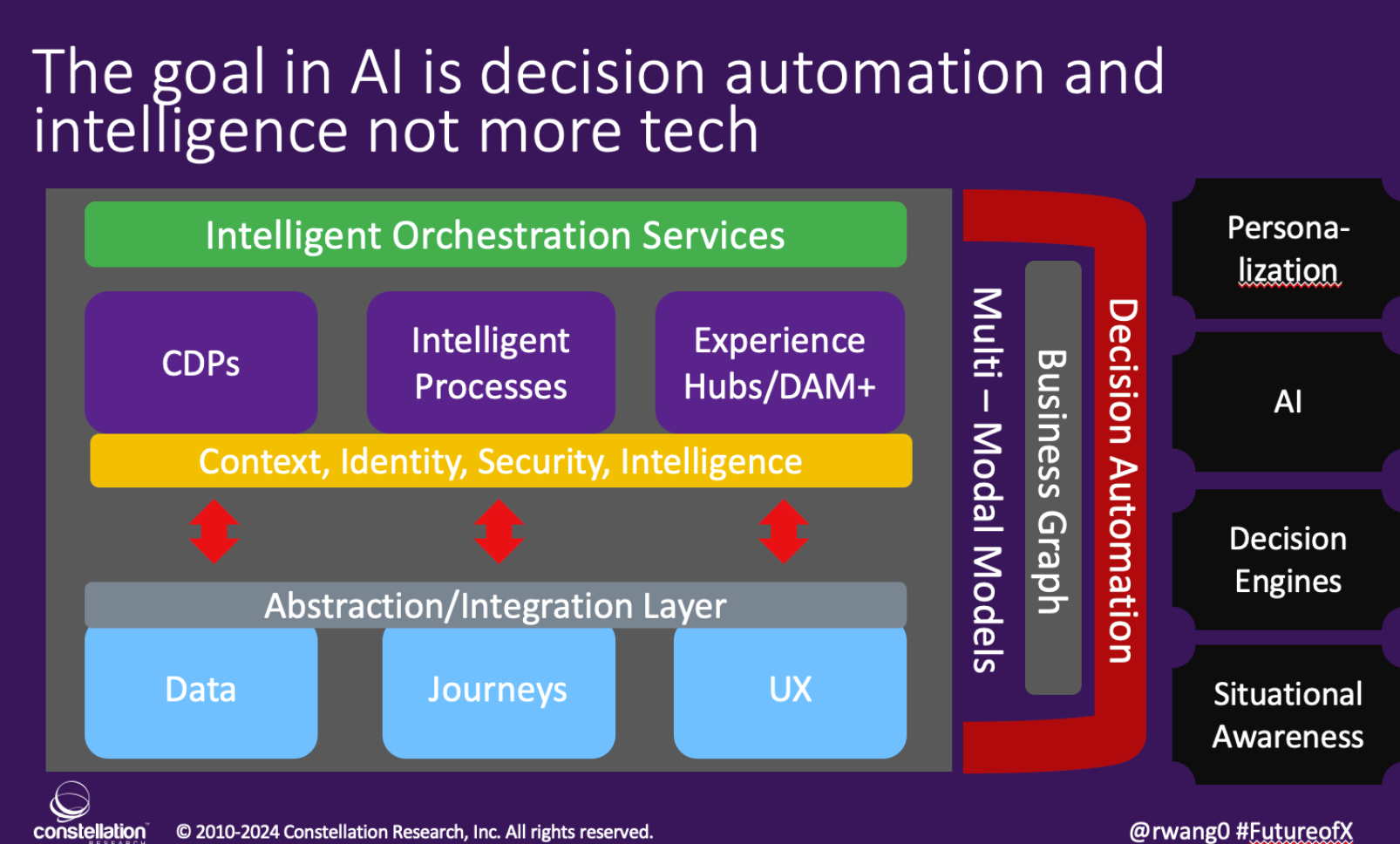
With that backdrop here's a look at some of the agentic AI developments worth watching.
The agentic AI ERP play
Enterprise resource planning (ERP) platforms can be playing a home game in the agentic AI race since they can connect data and context across multiple functions. SAP CEO Christian Klein was obviously talking up his company's Joule genAI and agent technology during the company’s third quarter earnings call, but he has a point. He said:
"While many in the software industry talk about AI agents these days, I can assure you, Joule will be the champion of them all. So far, we have added over 500 skills to Joule and we are well on track to cover 80% of the most frequent business and analytical transactions by the end of this year. And in Q3 alone, several hundred customers licensed Joule."
Microsoft can also play the ERP to AI agent game. The company launched 10 out-of-the-box AI agents. In Microsoft's view, Copilots are how you'll interact with the agents that will work on behalf of an individual, team or function to execute on processes.
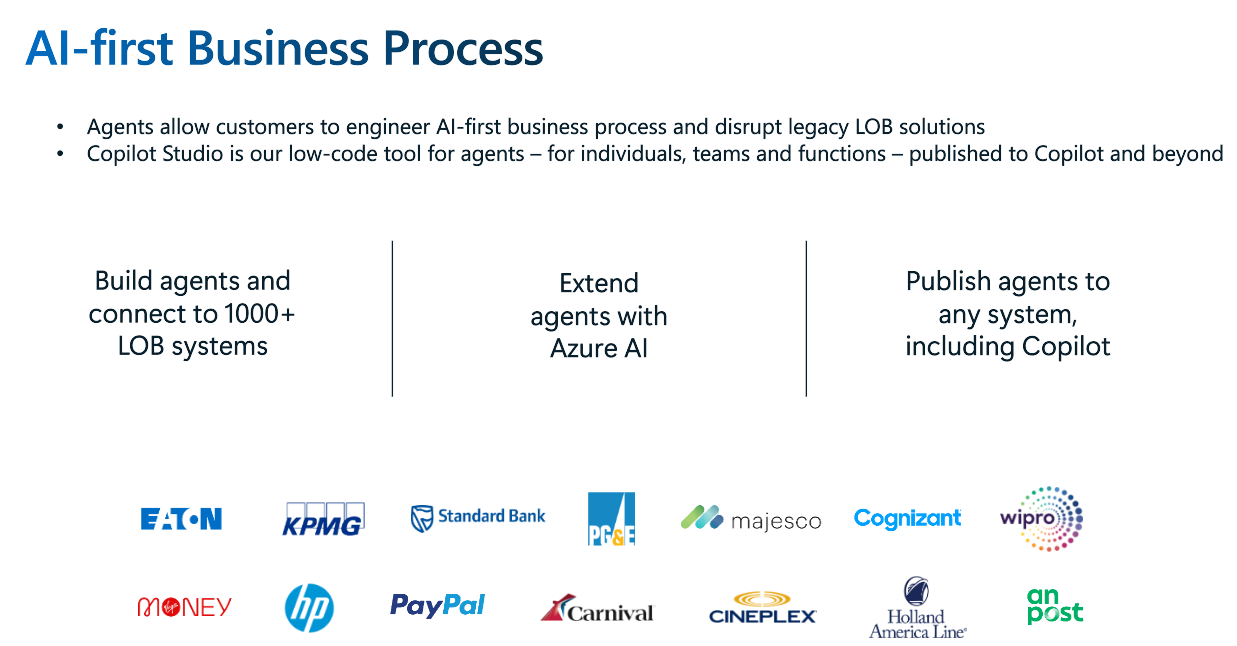
The biggest issue with the ERP focused AI agent plays--or CRM, HR or any other enterprise acronym of your choice--is that you're still locked in with a vendor.
Nevertheless, the combination of AI agents and well-structured data within ERP systems is likely to lead to quick returns. I am surprised that Microsoft didn't connect the dots more between its AI agents in Dynamics 365 and Power Automate.
The other wrinkle in this agentic AI ERP parade is ServiceNow's just announced partnership with Rimini Street along with its Workflow Data Fabric. The subtext: Maintain your legacy ERP system, abstract it with the Now Platform, save with third party maintenance and reinvest the savings in AI automation.
ServiceNow CEO Bill McDermott said on the company’s third quarter earnings call that enterprises want to avoid previous mistakes with ERP platforms and AI agent sprawl.
"The C-suite is looking to us to prevent a mess with AI," said McDermott. "Leaders see the risk that every vendor's bots and agents will scatter like hornets fleeing the nest. Enterprises trust us to be the governance control tower."
The neutral party, orchestration, automation play
At UiPath Forward, UiPath pivoted from robotic process automation to AI agent building and orchestration. UiPath made its name with RPA, process mining and task mining and then created an automation platform.
The new vision for UiPath rhymes with Microsoft's copilot-to-agents approach except the bridge is from RPA bots to agents. UiPath previewed Agent Builder, forged a partnership with Anthropic and set a vision that combines RPA, automation, robots and people to automate end-to-end processes. UiPath's play is that processes don't run in one system so you need a horizontal platform across the enterprise to be an agent conductor.
UiPath CEO Daniel Dines said:
"We can go end to end process automations. We can reduce a lot of human input into processes. We can make humans only the decision makers into a real process. I think many business applications will offer capabilities to create agents. We are very happy to orchestrate them."
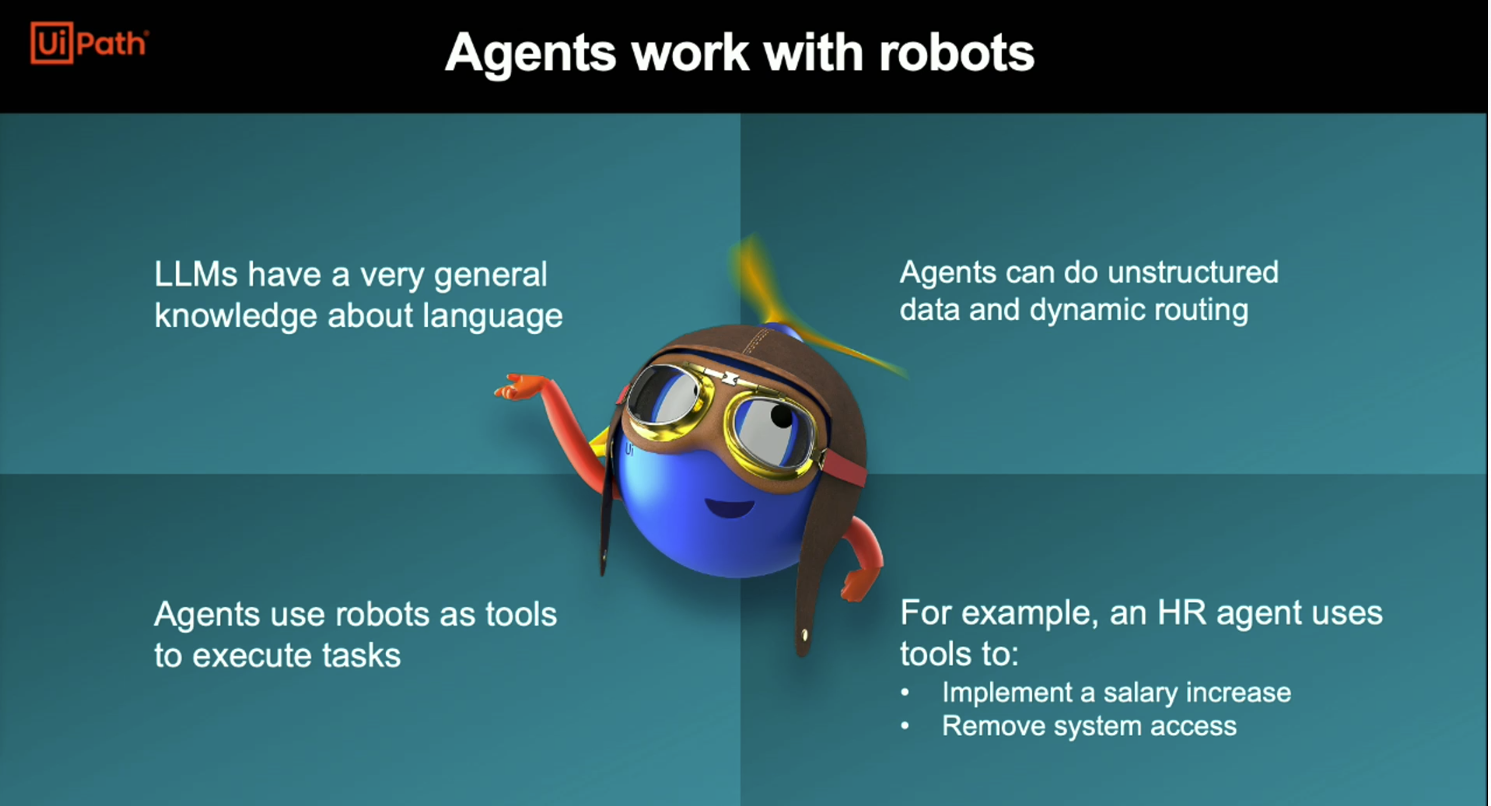
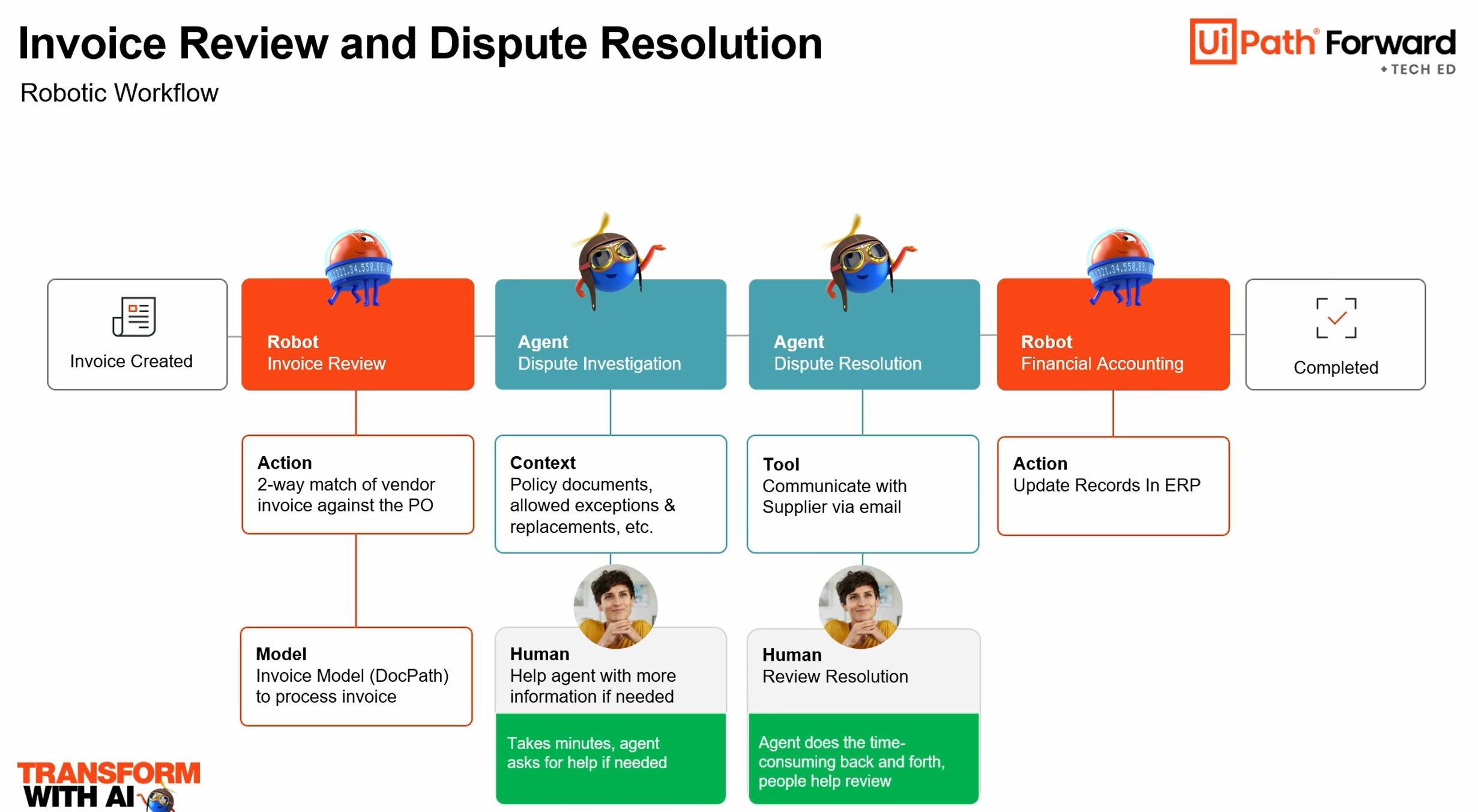
Dines said RPA and generative AI isn't a zero-sum game. "Our robots will provide the tools to the agent to connect to all of these platforms," he said. "Robots are low skilled. Agents are more highly skilled employees."
While UiPath's conference was underway in Las Vegas, Celonis held its Celosphere event in Munich. Celonis has focused on process intelligence with its platform and then feeds into various AI models with its digital twins of enterprises.
Celonis has taken an ingredient brand approach. It's worth noting that one session at Celosphere focused on the combination of Celonis Process Intelligence and Amazon Bedrock, which is also likely to play a big role in building AI agents and orchestrating them.
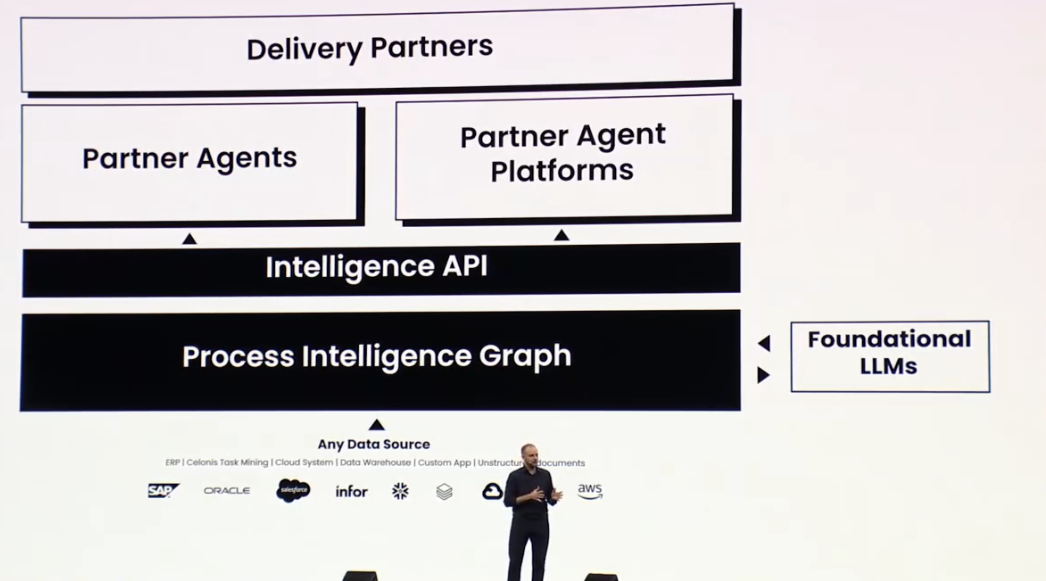
Celonis launched Celonis AgentC, a suite of AI agent tools, integrations and partnerships. Celonis is looking to embed its Process Intelligence into AI agents to add business context. Celonis' first platform integrations include Microsoft Copilot Studio, IBM watsonx Orchestrate, Amazon Bedrock Agents and open-source environments like CrewAI.
Here’s a graphic on how this Process Intelligence integration works with Microsoft Copilot Studio.
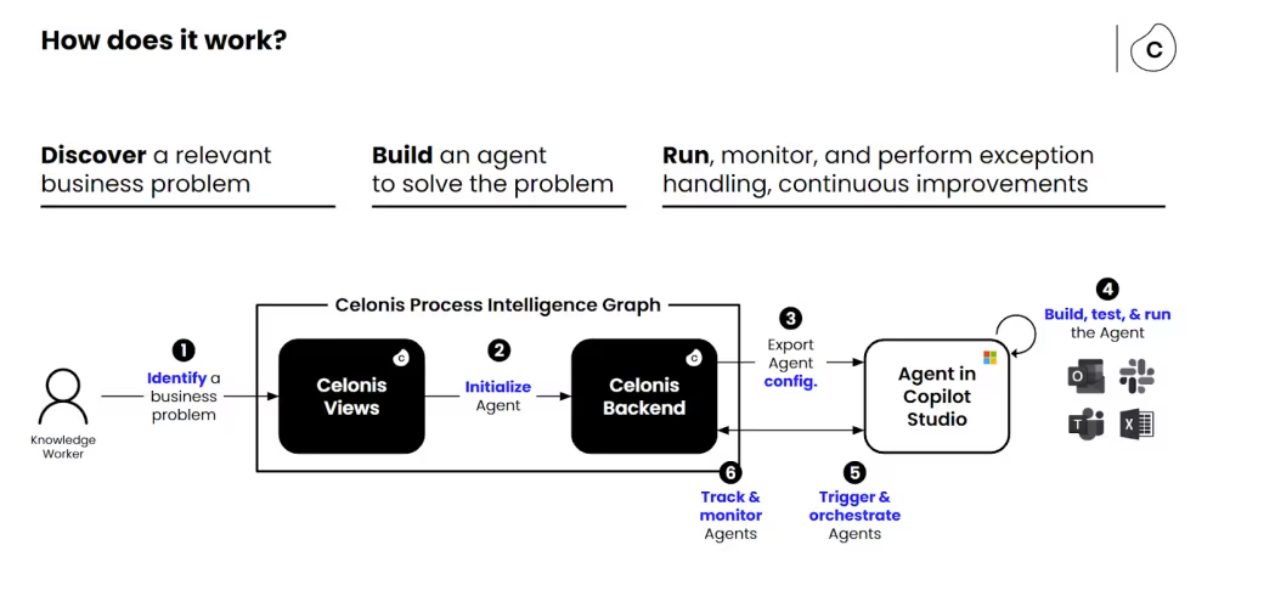
"You can now power AI agents with process intelligence," said Celonis co-CEO Alex Rinke. "This is AI that knows how your business flows."
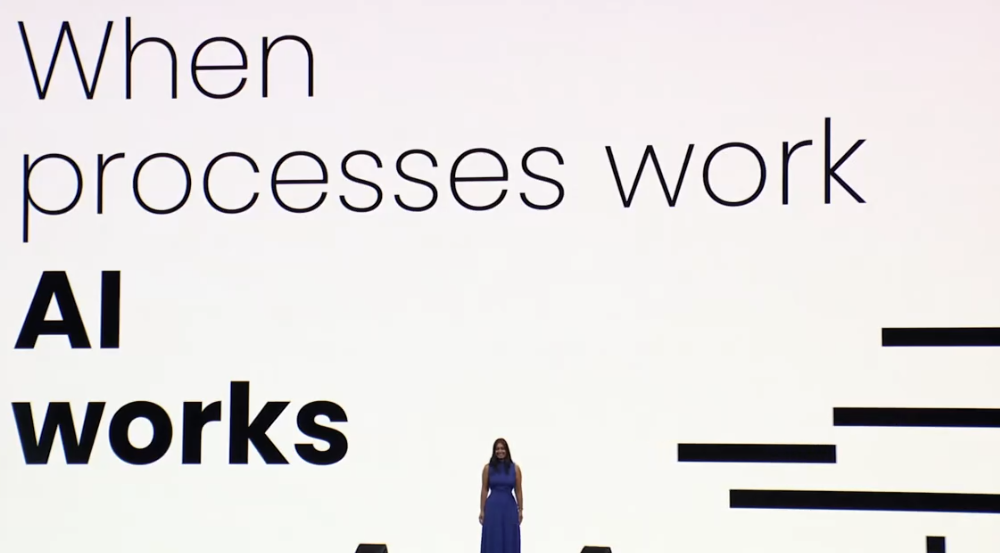
The sales playbook for UiPath and Celonis has been cribbed by multiple agentic AI vendors that have focused on use cases, enterprise functions and industry applications.
ServiceNow is also playing the role of the broad neutral party that can connect various models, workflows and systems. The company has already layered agentic AI into its Now Platform and for that matter could acquire either UiPath or Celonis.
Lingering questions in an evolving landscape
This riff on agentic AI, the role of automation and process optimization is a work in progress because vendor strategies--and yours for that matter--are being cooked up as we speak.
Among the key questions:
- Can Salesforce leverage MuleSoft to take Agentforce beyond front-office functions?
- How many first movers in agentic AI will find themselves buried in agent sprawl?
- Will the neutral parties today ultimately be acquired? SAP and UiPath are already cozy partners. Aside from the trillion-dollar valuation club no vendor is too big to be acquired.
- Can integrators be the agentic AI orchestrators? For instance, Infosys CEO Salil Parekh said the company has been focused on small language models, use cases and processes to create multi-agent frameworks to automate work. "We have a multi-agent framework where the agents are doing--a set of agents are doing full solutions to certain business processes or certain functions," he said.
- What role will hyperscale cloud providers take on? AWS doesn't have any applications in this fight and is truly horizontal. It could have a big role in building and orchestrating agents in the background. Ditto for Google Cloud.
- Does ServiceNow emerge as the agentic AI point guard for enterprises? McDermott is betting that way. "We intend to be the control point that governs the deployment of agentic AI across the enterprise," he said.
With so many agentic AI moving parts, CxOs may want to lump agentic AI plans with broader process transformation and automation strategies. Agentic AI looks great, but keep process, automation and orchestration top of mind.


